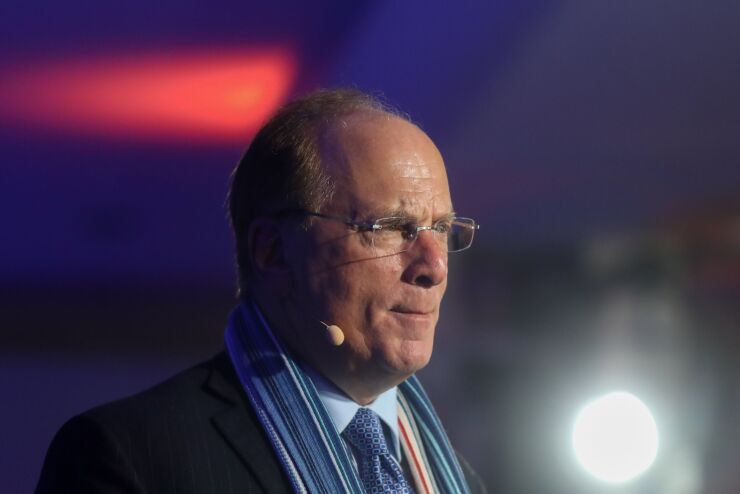The popular image of ETFs is of a young, scrappy corner of the staid asset management industry. But when it comes to racial diversity, there’s little evidence that the sector is any better than its longstanding counterparts.
For Stoy Hall, a senior wealth advisor at Centric Wealth in Iowa, who is African American, Black representation in the ETF world is “extremely” lacking — “How many minority-owned ETFs do you know?” he said.
Only one fund — NACP, which has $7.7 million in assets — focuses on racial minority issues.
The exact racial breakdown of the industry is difficult to determine. Some of the companies that issue the funds, like BlackRock and Vanguard, release firmwide diversity reports. But they don’t break out data by department and wouldn’t release that information to Bloomberg News.
-
“We started with 40 people just marching, and it turned into 15,000," an advisor says.
June 11 -
An advisor whose family has been “irrevocably harmed by police brutality” calls on industry peers and their clients to spark positive change.
June 3 -
The firm said in a post on Twitter that it "has zero tolerance for racism and discrimination of any kind."
June 15
Research firms like McKinsey & Company, Cerulli Associates, Brown Brothers Harriman and Morningstar haven’t done any studies, either. Neither has Women in ETFs, a group focused on gender diversity. (There’s no similar group for Black people.)
“How many minority-owned ETFs do you know?”
Ask people working in the industry, and some will say they see more Black people in their departments than elsewhere around the office. Because the funds are a relatively new power player—assets have quadrupled to $4.7 trillion since 2011—the field doesn’t have the kinds of entrenched networks that keep non-white males out of power.
“Classic rich white guys go for the big bucks in hedge funds,” said Eric Balchunas, an ETF analyst for Bloomberg Intelligence.
Black people working in the ETF industry say it’s a microcosm of the rest of Wall Street. Established recruiting channels often exclude people of color and there are few mentors for those who do make it into the field, they say.
Much like other Black people on Wall Street, Hall said there’s usually just a few people of his race at events and in meetings. “People of color always know that when we go to any of these conferences, we will most likely be the only one there,” he said. “It’s not a shock to us.”
One of the most high-profile people in the ETF world is a Black man, but even he says there are barriers to entry for others like him. GTS Mischler Principal Reggie Browne is known as the “godfather” of the field after helping bring the first funds to market more than 20 years ago.
“People will point to me and say there’s this guy here,” Browne said. “They can take some comfort in that. By and large, is it a world that is free and fair? I wouldn't necessarily say that.”
The decade’s top performers also outpaced broader markets over the short term.
The small numbers of Black staffers at some ETFs still may be an improvement compared with the larger finance industry, which is overwhelmingly white. As of mid-June, there was only one Black executive among the 80 people on the most elite teams at the six biggest U.S banks. Fund companies with at least 25% minority ownership control less than 4% of private equity and mutual funds.
In response to nationwide Black Lives Matter protests, BlackRock CEO Larry Fink this June committed to increasing his company’s Black workforce 30% by 2024. Its iShares division is the largest ETF issuer in the U.S., which controls almost $1.8 trillion.
BlackRock declined to disclose the number of employees in its iShares division, but the company employs more than 16,000 people worldwide, about 5% of them Black.
The ETF industry also prides itself on launching socially responsible funds. In recent years, those that focus on environmental, social and governance issues have seen a surge in investments to almost $39 billion. But only two address women’s issues and only one is dedicated to minority empowerment.
That fund — the Impact Shares NAACP Minority Empowerment ETF, or NACP — screens companies for traits like diverse boards of directors and participation in community engagement programs. The firm is structured as a non-profit organization, with about 50 of the 76 basis points charged going back to the NAACP as a donation.
“Making a more diverse and inclusive workplace, not only does it make sense from a business standpoint,” said Ethan Powell, president and founder of Impact Shares. “It’s the right thing to do in terms of building a strong, well-rounded and diverse middle class in the U.S.”







